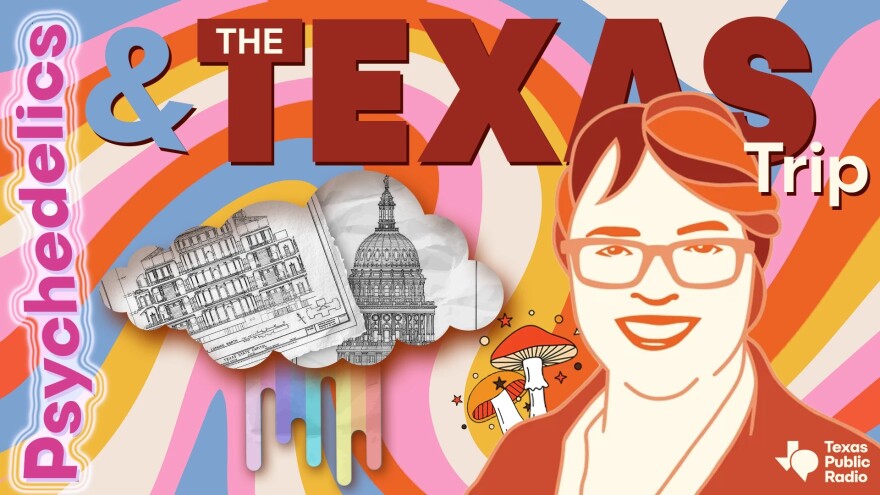Gov. Greg Abbott has signed into law what advocates say is the largest state-funded psychedelic research initiative in history. It will provide up to $50 million to help bring ibogaine – a psychoactive substance used in traditional cultures in Central West Africa – through clinical trials in the US.
Ibogaine, like most psychoactive compounds, is classified as a Schedule I drug: illegal to use or possess in the U.S. for decades.
In recent years, however, there has been a growing interest in studying psychedelic therapies, which have shown potential to help treat depression, PTSD, substance use disorders, and traumatic brain injuries.
Reporter Robin Berghaus and host Bonnie Petrie produced a three-part podcast series called Psychedelics and the Texas Trip with a team at Texas Public Radio. The series explores the science and history of psychedelics, their potential health benefits and risks, and the unlikely allies in Texas who united to support this research.
Part 1: Unlikely allies
Marcus Capone was considering suicide. The U.S. Navy veteran had spent 13 years as a member of SEAL team 6, but it was life after service that was overwhelming to him. Capone had traumatic brain injuries, depression, and post-traumatic stress disorder, and none of the traditional treatments were helping.
He tried talk therapy. He tried hyperbaric oxygen therapy and transcranial magnetic stimulation. He visited several brain clinics. He tried a variety of antidepressants.
Invisible wounds, just as real as the ones that leave scars on your skin, were killing Capone. That’s when his wife, Amber, suggested psychedelic therapy. With little left to lose, Capone tried it.
He says it changed everything. Psychedelics, he says, saved his life.

In part one of a three-part Petrie Dish series, Psychedelics and the Texas Trip, host Bonnie Petrie and reporter Robin Berghaus explore the winding road that brought a bill to fund a clinical trial of psychedelics as a treatment for veterans diagnosed with PTSD to the Texas Legislature.
You’ll hear more of Capone’s story. You’ll also hear from the people who crafted the bill — former state Rep. Alex Dominguez, D-Brownsville, and Legislative Director Logan Davidson. Then, an unlikely ally takes center stage.
Former Texas Gov. Rick Perry tells the Petrie Dish team how he — a man with unimpeachable conservative bona fides — became an outspoken advocate for psychedelics-as-medicine.
Part 2: The science and history of the medicine
In part two, host Bonnie Petrie and reporter Robin Berghaus explore the science and history of psychedelic therapies.
Our Texas trip takes us from Austin, where we spent much of our first episode, to San Antonio and Houston, where we dive more deeply into our discussions with veterans who have left the United States to try psychedelic therapies to treat their depression, PTSD, traumatic brain injuries, and substance use disorders. With so many patients finding relief, why do psychedelic therapies mostly remain illegal in the U.S., and how do psychedelics actually work?

In Houston, we also speak with Dr. Lynnette Averill, who is leading a psilocybin clinical trial for veterans with PTSD at Baylor College of Medicine and the Menninger Clinic. Averill explains how psychedelics work on the brain to produce healing effects.
We speak with Ryan Roberts and Gabe Gonzalez, U.S. veterans who were at their breaking point. They share why they pursued ibogaine and psilocybin therapies, what that process entails, and how they’re doing today.
Then, Dr. Albert Garcia-Romeu at Johns Hopkins School of Medicine reveals the political reasons and Nixon-era legislation that hindered psychedelic therapy research in the U.S. for decades and what could be done to support research today.
Part 3: The road ahead
In the final episode, host Bonnie Petrie and reporter Robin Berghaus explore ancient traditions of psychedelics as spirit medicines and what’s in store as psychedelics become mainstream.
Our trip starts in Rio Grande City, Texas, where Zulema “Julie” Morales shares her family’s tradition and role as a peyotera. Morales is one of three people in the U.S. who are licensed to harvest and sell peyote to Native American Church members, the only people in the U.S. who can legally purchase it. To them, peyote is a sacramental medicine, which they have used for centuries.

Indigenous scholar and author Dr. Yuria Celidwen, a senior fellow at the Othering and Belonging Institute at UC Berkeley, shares how these ancient indigenous practices are under threat from their “medicalization” and “commodification,” and shares ways that collaboration between culturescan honor and preserve those heritages.
Then, we travel back to Austin and South by Southwest, where researchers, advocates, and business professionals gather to discuss the potential benefits and consequences of the psychedelic renaissance. Science journalist Jane C. Hu, shares updates on clinical trials and state laws that are aimed at making psychedelic therapies accessible in the U.S.
For our final trip, we head back to the Texas Legislature and speak with supporters of the state’s latest psychedelic bill, HB 3717, which would fund a public-private partnership to bring ibogaine therapy through clinical trials. Advocates believe ibogaine therapy could be a breakthrough treatment and help mitigate the opioid crisis.
This special series is supported by a Ferriss — UC Berkeley Psychedelic Journalism Fellowship.



